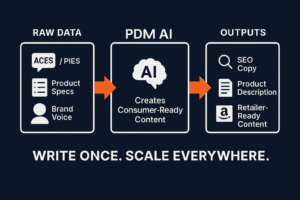From custom parts designed to appeal to enthusiasts, AI is set to alter how products are created, sold, and managed.
While many folks are familiar with the overall concept of AI, most don’t realize how often this technology is already being utilized, especially in business.
According to a Forbes Advisor survey, businesses are already using AI tools regularly:
- 56% are using AI to improve and perfect business operations.
- 51% are turning to AI to help with cybersecurity and fraud management.
- 47% harness AI tools in the form of digital personal assistants.
- 46% are using AI for customer relationship management.
- 40% are turning to AI for inventory management.
- 35% are leveraging AI for content production.
- 33% are using AI for product recommendations.
- 30% are turning to AI for accounting assistance and supply chain operations.
- 26% harness AI for recruitment and talent sourcing.
- 24% are using AI for audience segmentation.
In the automotive aftermarket space, AI can help businesses focus more on bringing products to market and spend less time on laborious processes.
Let’s explore AI further to learn what it can offer and why you should be excited about its future.
Back to basics: What is AI and what does it do
Before we discuss AI’s benefits, let’s take a crash course in this technology and why it matters in the broader world marketplace.
Artificial Intelligence (AI) is a broad field of computer science focused on creating machines capable of performing tasks that typically require human intelligence. These tasks include problem-solving, recognizing patterns, understanding language, and making decisions.
In short, AI aims to simulate natural intelligence to solve complex problems efficiently.
The most prominent technologies used in the AI industry include:
- Machine Learning (ML): A subset of AI that enables systems to learn and improve from experience without being explicitly programmed. Involves the development of algorithms that can process and learn from data, making it possible predictions based on historical data.
- Natural Language Processing (NLP): This technology helps computers understand, interpret, and generate human language. NLP allows machines to read text, hear speech, interpret it, measure sentiment, and determine which parts are essential.
- Neural Networks and Deep Learning: Neural networks are inspired by the human brain’s structure and function. They consist of layers of nodes or “neurons” that process information. Deep learning involves neural networks with many layers, enabling the handling of large volumes of data.
AI strives to mimic human cognitive functions at its core, enabling it to learn from and adapt to new data without human intervention. Machine Learning is one of today’s most exciting and widely applied AI technologies.
By learning from vast amounts of data, ML algorithms can take actions based on patterns improving their accuracy over time.
This capability is the backbone of many modern conveniences from personalized recommendations on streaming services to predictive maintenance in manufacturing.
Natural Language Processing and Neural Networks/Deep Learning further expand AI’s capabilities, allowing for more natural interactions between humans and machines and enabling machines to tackle tasks that involve understanding complex patterns or data structures, such as voice assistants, translation services, and even autonomous vehicles.
How AI enhances aftermarket data accuracy and consistency
AI’s ability to quickly correct data anomalies ensures aftermarket businesses can maintain high data quality standards with less manual intervention.
Can help companies manage their ACES (Aftermarket Catalog Exchange Standard) and PIES (Product Information Exchange Standard) data.
Automated data cleansing and error correction
AI algorithms can identify inconsistencies, incomplete entries, and errors in ACES and PIES data, ensuring high data accuracy and reliability.
Enhanced data classification and categorization
Through machine learning, AI can improve the classification within these standards, making it easier for users to find products.
Dynamic data uploading and expansion
AI can help automate the process of updating and expanding ACES and PIES databases, incorporating information faster than manual methods allow.
By leveraging AI, companies can achieve a level of efficiency in managing their ACES and PIES data that was previously unattainable.
Automated data cleansing mean that the complex databases of automotive parts are kept up-to-date.
AI optimizes search and discovery
For automotive aftermarket companies, harnessing the power of AI, specifically through Natural Language Processing (NLP) and image recognition, can revolutionize how customers find and purchase the parts they need.
Understanding and processing user queries more effectively
NLP allows search engines to interpret the intent behind a customer’s search terms, even when phrased in colloquial or technical language. This means that whether a customer types in “brake pads for a 2013 Toyota Camry” or “front brakes for Camry,” the system understands and processes the request accurately.
Offering more relevant search results
By grasping the nuances of human language, NLP-powered searches can filter and present results that closely match the user’s intent, reducing the time customers spend sifting through irrelevant products.
Enabling part identification through images
Customers can upload a photo of the part they need, and image recognition technology can identify it, even without a part number or detailed description. This feature is handy for customers needing more technical knowledge to accurately describe the part or for parts challenging to categorize solely by text description.
AI helps craft product descriptions
A compelling product description is one of the most important components of selling a product online. Automotive aftermarket companies stand to gain significantly from AI-powered content generation, a technology that can transform how products are presented to customers.
There are several advantages for aftermarket companies, especially for those with limited staff or resources:
- AI can analyze a product’s specifications and features to generate detailed, engaging descriptions. This ensures customers have all the information they need to make an informed decision.
- Algorithms can tailor product descriptions to match the interests and preferences of different customer segments. For instance, descriptions for the same product can vary to highlight aspects most relevant to different types of customers, such as performance enthusiasts versus safety-focused family car owners.
AI extends to extracting and emphasizing the most critical features of products, enhancing how they are evaluated by customers:
- Using AI to sift through product data to pinpoint features most likely influencing a purchase decision. By highlighting these key attributes, companies can direct customer attention to what matters most, enhancing product appeal.
- By understanding and highlighting the most relevant product features, AI also improves the product’s visibility in search results, whether on search engines or within the company’s own website. This aids customers in finding what they need faster and improves the overall user experience.
Enhancing customer support and services
A compelling use case for AI is enhancing customer support through AI technologies, such as AI-powered chatbots and virtual assistants. These technologies can improve the customer experience and offer gains in efficiency.
AI-powered chatbots and virtual assistants can respond immediately to customer inquiries around the clock. This instant access to information can enhance the customers’ shopping experience with the answers they need when they need them.
By automating responses to frequently asked questions, AI can free up human customer service representative. This increases overall efficiency and ensures customers receive quick, accurate answers to their most common queries.
Savvy aftermarket companies can see that integrating AI into automated support for installation and troubleshooting represents an advantage in customer service capabilities.
Automotive aftermarket companies can use AI to create detailed, easy-to-follow guides and tutorials for product installation and troubleshooting. By analyzing common issues, AI can help tailor these resources, making DIY installations easier to create at scale.
Balancing AI with human oversight
As automotive aftermarket companies increasingly integrate AI into their operations, several considerations must be addressed to ensure these technologies’ successful and ethical implementation.
the need for continuous training and updating of AI systems requires ongoing training to stay effective and relevant. As product ranges expand, AI models must be continuously fed with updated data and retrained to maintain accuracy and efficiency. This requires a commitment to investment in technology and expertise to manage these systems over time.
Human expertise is also necessary for handling complex customer queries that AI may not be able to fully understand.
Transform your automotive aftermarket business
Streamlining the data management process significantly reduces operational costs and increases sales potential by ensuring that customers find exactly what they need when they need it.
PDM Automotive is your ally in an increasingly complex digital marketplace.
Thanks to our deep expertise in the Product Information Management space our team offers to helping automotive aftermarket brands connect with buyers across multiple eCommerce platforms.
PDM Automotive transforms how automotive businesses manage and distribute their product information, offering unparalleled accuracy, efficiency, and market responsiveness. A properly integrated PIM elevates the customer experience by providing detailed and reliable product data and empowers businesses to adapt to market trends and launch new products with ease, giving them a competitive advantage.
To truly understand the impact of PDM Automotive’s PIM system on your business, we invite you to book a demo today and see the difference for yourself.

More Resources
Elevate Your Brand in the Automotive Aftermarket With These Content Management Strategies



